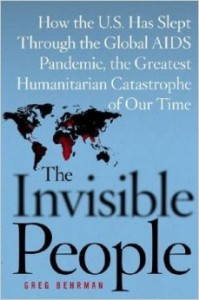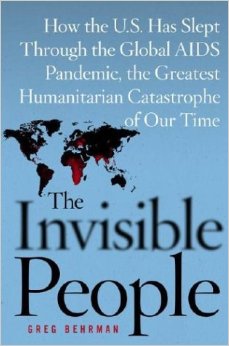 The Invisible People: How the United States Has Slept Through the Global AIDS Pandemic, the Greatest Humanitarian Catastrophe of Our Time
The Invisible People: How the United States Has Slept Through the Global AIDS Pandemic, the Greatest Humanitarian Catastrophe of Our Time
by Greg Behrman
Free Press. 368 pages, $25.
GREG BEHRMAN’S new book offers a compelling look into the United States’ failure to respond to the global AIDS pandemic starting in the 1980’s. The book opens with a quotation from Ralph Ellison’s The Invisible Man: “I am an invisible man. I am invisible, understand, simply because people refuse to see me.” Behrman sees a direct connection between American racism and the nation’s blinkered response to the global AIDS crisis, which is heavily concentrated in sub-Saharan Africa (where seventy percent of those infected reside).
That bigotry is the driving force behind our nation’s AIDS policy is nothing new to the gay community. When the epidemic began ravaging gay men in the early 1980’s, the Reagan Administration could not be awakened from its apathetic slumber—that is, until it became clear that heterosexuals could also contract the disease. Just as homophobia is what prevented Reagan from dealing with the U.S. crisis sooner, racism is at the heart of subsequent administrations’ tendency to ignore “the African holocaust.” The “how” in the book’s extended subtitle is thus answered with reference to a racism that Behrman sees as underpinning our government’s institutions, policies, and ideologies. Journalist Bart Gellman is quoted as having argued at the National Intelligence Council in the late 1980’s that many people saw AIDS as “good for Africa because Africa is overpopulated anyway.” Behrman surmises that if an epidemic were poised to annihilate twenty to thirty percent of, say, Western Europe, our government’s response would surely have been different.
Behrman also locates an undercurrent of racism in the media, which largely ignored the global epidemic until the late 1990’s. What went unreported were the titanic battles over which government departments would manage and fund global AIDS programs, how people with combative egos sought to steal the limelight at the expense of addressing the global crisis, and on and on. Furthermore, African leaders seemed reluctant to discuss the connection between HIV and Africa for fear of stoking racist stereotypes about Africans as oversexed, thus exacerbating the problem.
Public awareness of the global epidemic was awakened by a series of events in the late 1990’s. The development of effective HIV drugs that were saving lives in the U.S. pointed to the glaring inequality between the rich and poor countries. American activists started to rally for global access to the new medications. Groups like the Global AIDS Action Committee of act-up and the HealthGap Coalition were born, and the reach of HIV activism began to extend beyond the U.S. In 1999, the media began to cover the global catastrophe as a humanitarian issue. After 9/11, the disease was recast as a matter of national security. At the same time, people like UN Ambassador Richard Holbrooke and the economist Jeffrey Sachs, as well as influential journalists like Bart Gellman and John Donnelly, began looking at AIDS from a foreign policy perspective and saw critical economic and geopolitical consequences. In 2002 the Global AIDS Fund was established, representing “a new brand of international institution—independent, apolitical, results-and-performance based, and sensitive to national and local particularities.” Microsoft’s Bill Gates pledged $100 million to the Global AIDS Fund, while U2’s Bono met with leaders in the U.S. and abroad, including the retrograde Senator Jesse Helms, who became a minor crusader in the fight against global AIDS.
In his 2002 State of the Union Address, George W. Bush made the staggering announcement that he would ask Congress to commit fifteen billion dollars to fight HIV and alleviate suffering in poor countries over the next five years. However, it quickly became clear that there were holes in this pledge: only one billion would go to the Global AIDS Fund, while another nine billion would be administered by the U.S. government, making the allocation of funds vulnerable to “national politics and quite possibly religious dogma.”
Though the walk through this labyrinth of bureaucracy is sometimes dizzying, The Invisible People is an erudite elucidation of the many ways we went wrong. Above all, it is a spirited plea for a more humane and equitable policy in the U.S. that expands upon our newfound awareness of the epidemic’s devastating impact on the people of Africa.
________________________________________________________
Stephanie Fairyington is a freelance writer living in Brooklyn.






